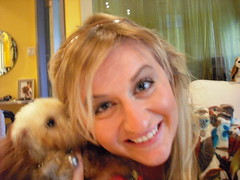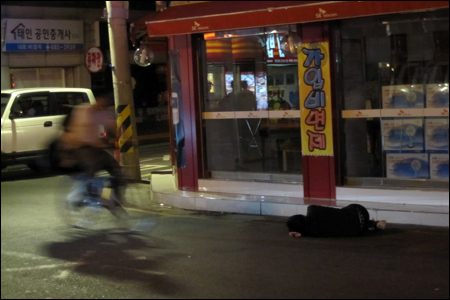Hello, World
Fitting in is hard. It requires some sort of conformity and a sense of understanding shared between people in a specific group. It is not uncommon for people to find it hard to fit into a group, whether it is social circles in school or colleagues at work. Now imagine the “social circle in school” as an entire culture. This is the story of my personal journey towards self-discovery and self-identity. This is the story of how I am trying to fit in.
The topic of “culture” is somewhat foreign to Americans in the United States because the United States is a potpourri of cultures built from a foundation of immigrants. In its basic anthropological essence, the
word “culture” describes a way of living built by a group of human beings that is passed down through generations. The truth of the matter is that American culture is built upon a hodgepodge of the customs and cultures of its members—diverse immigrant populations. And it is uniquely this feature that makes American culture so different from any other culture in the world; American culture is, in itself, the absence of an absolute culture. In contrast, civilizations like China demonstrate a society whose cultural background spans thousands of years. Through its two-thousand year old history, China has created a national cultural identity, due in part by behaviors and customs passed down generations. It can be argued that Chinese culture, in some ways, is a stark contrast to American culture. Whereas Chinese people have traditions firmly grounded from ancient tradition such as the concept of Yin and Yang, Americans have traditions that are American versions of another culture’s tradition, such as the concept of Santa Claus.
That said, this blog is about me. I am a Chinese girl who grew up in the United States. While others spend their college years searching for what they are going to do after graduation, I spend my college years not only searching for my destiny, but also my cultural identity and where I fit in. Torn between two worlds, I grew up eating rice for lunch in an American elementary school in the sea of bologna sandwiches.
Figure 1: I took this picture in a shop Shanghai. Classic case of East meets West.
I am well aware of the books found in the “Self-Help” section of bookstores that deal with the subject of “finding one’s self” and “knowing one’s self”, but the journey in finding my own cultural identity is far less cliché. As a matter of fact, I am still struggling to find my place between the two cultures. Essentially, people in the United States would consider me to be Chinese American. But to me, those two words carry a heavy meaning upon my shoulders. From this identification, one could deduce that I was both Chinese and American. But in reality, I felt neither Chinese nor American. Throughout my travels in China, however, I was considered purely Chinese. Until I opened my mouth. And even still, after enduring my broken Mandarin, Chinese people assumed that I was Korean, Japanese… but never American. This is my problem exactly: I am not Chinese nor am I American, regardless of what color my passport is.
I dream of a day when I tell people that I grew up in Chicago, the look of genuine surprise would not flit across their faces. I dream of a day when follow-up questions do not consist of “But what ethnicity are you? Chinese, Korean, Japanese?”
Through all this adversity, I struggle to find which society I identify with the most. Or if I identify with any at all. I struggle to find which culture shapes who I am as a person, whether be at home with my “super Asian” parents, or at school where I have to explain what “shumai” was to a friend (which, if you were wondering, is a shrimp dumpling), making me the “cultured one”.
This is a blog about my experiences of being a Chinese American, stuck between two cultures and their customs. I am just a girl, being pulled apart in this tug-of-war of two very different cultures.
Profile
Figure 2: Elena and Frankie
Elena Garcia is your average American. Blonde hair, green eyes and living in San Francisco with her husband Garrett and her dog Frankie. In any other respect, she and I do not have much in common. I do not know who her favorite singer is or what her mother’s maiden name is, but despite my lack of knowledge about her, I feel like she and I are already close friends.
Elena Garcia’s blog, “An American Girl in China”, details Elena’s personal one year “Adventure in Shanghai”. She started her journey on
November 2008, where she begins by packing away her life San Francisco to move to Shanghai for an entire year, and ended her journey on
January 2010, where she is back in the United States with lots of experiences in Chinese society under her belt. Elena’s initial perspective of China was naïve, and it is her initial naivety that made me read her blog. She, like me, was both excited and optimistic about traveling in China. In her blog, Elena not only talks about her experiences with Chinese people and Chinese society but also about her travels. She posts just as much about her own life as she does about her experiences with Chinese people—the post about
rock climbing in the Shanghai Indoor Stadium is followed by her
rant about slow walkers in the morning.
Much like Elena, I went on a journey to China this past summer. And like Elena, I went to Shanghai. I was a “foreigner”, although I did not entirely look the part. The luxury Elena had in China was that she had an excuse for being different, clumsy, and overall lost and confused (she looked Caucasian), as I did not (I looked Chinese). This did not stop us, however, from having similar experiences and sharing the same feelings towards those experiences. One thing in particular stood out to me, in her post
“No Autographs Please!” dated June 10, 2009.
“People in China stare… they stare at us, they stare at each other, they stare at random objects, they just stare. It’s not rude, it’s not polite, and it’s not anything, they just stare! … But for some reason it really got under my skin. I’ve settled so much already during my stay here. I mean I put up with the spitting, the staring, the pushing and shoving, I feel like I have reached my limit. Any more unwarranted attention, disrespect or cultural nuances and I might lose it.”
Figure 3: Posing for the camera as bystanders (off camera) stare
Had I read this over the summer, I may have cried.
This, what she colloquially describes in her post, was
exactly what I felt during my travels in the same city of Suzhou. In this one post, Elena pinpoints one of the main reasons I picked my blog topic—how can I be Chinese, yet not understand why Chinese people do certain things? How can I be Chinese, but through my American upbringing, I feel angry and offended by Chinese people? By feeling angry at Chinese people, does that mean I am angry at myself and secretly self-loathing?
In “
All Sorts of Goodness”, Elena writes
“People squat on the floor to pee, they make magnificent noises when they are hocking up a loogie, and they flick their boogers onto the shoes of passer bys.”
Figure 4: Butt-less pants for children; very common in China
Elena’s relativity makes her blog like an older sister to my blog. As referenced in the previous quote, Elena’s experience with the habits of Chinese people makes it very easy to relate to, as someone who went through the same thing.
Unfortunately, it has been more than a year since Elena has posted on the blog. She returned to the United States in January 2010, thus ending her “Adventures in Shanghai”. Elena’s blog was purely for personal use, and therefore never gained much attention from the public. For her, this blog was a way of documenting her experience of being a foreigner in a foreign country, to share with family and friends. Although we have similar topics, my blog will feature an Asian American view of the same experiences—because believe me, Chinese Americans and Caucasians are treated very differently in Chinese society (even though this blog post details our similarities) . My blog will not be something I will share with family and friends to update them about my life, but rather an evaluation of who I am, and how I will try finding my identity, when I do not fit into a particular society at all.
Voice Critique
Asian Mothers: the epidemic sweeping households everywhere by storm... but in internet sensation form.
In light of a recent controversy involving a certain Yale professor and her “
Battle Hymn of the Tiger Mother”, there have been many criticisms about stereotypical Asian mothers and their parenting ways. One such criticism comes from an “
Angry Asian Man”. Not only does he clearly convey his opinion about the
Wall Street Journal article written by Amy Chua, a professor at Yale, but he does this in typical “Angry Asian Man” style.
Figure 5: Angry Asian Man blog
“Angry Asian Man” is a very sarcastic, witty, and satirical blog, because this blog is in fact not written by a constantly angry Asian man. By calling himself an “Angry Asian Man”, the author of this blog evokes a certain personality even before the audience reads his content. His style, which is demonstrated through one particular post “
your permissive western parenting is inferior”, is very indicative of his particular style of voice. This blog post explains the author’s opinion on the recent Wall Street Journal article of an Asian “tiger mother” who defends her extreme parenting style. The post starts with
“Yes, I have read Amy Chua's Wall Street Journal piece, "Why Chinese Mothers Are Superior," and yes, I think the author is crazy.”
Figure 6: Fearless Tiger Mother Amy Chua
Through this clever technique linking to the original article that Angry Asian Man is commenting on, the author clearly states the source of the topic as well as inserts his own beliefs and opinions in the very beginning of the blog post. The author answers questions that were not asked by the audience, which demonstrates a sense of exasperation, and sets the tone for the whole post.
“To be honest, at first I thought it was satire, until I was hit with the sickening, sinking realization that Chua is dead serious. She's completely embraced the model minority myth, and is the living embodiment of the Hardass Asian Mom... on friggin' steroids.”
Through this example, the author combines both a serious tone and a colloquial tone. The serious tone is evoked through his use of alliteration and negative adjectives, such as “sickening, sinking” and “dead serious”. Instead of just saying “serious” and “realization”, the author uses very emotionally heavy adjectives to describe his initial reaction. He goes on to say that Amy Chua is “the living embodiment of the Hardass Asian Mom… on friggin’ steroids.” This sentence is quintessential “Angry Asian Man” style. He capitalizes “Hardass Asian Mom” as a reference to a common stereotype that he assumes his readers understand—after all, his target audience is the Asian American community. Not only does he reference “Asian Mom”, which in itself contains certain stereotypical qualities, but he also inserts “Hardass” and “… on friggin’ steroids”. By doing so, the overall effect is that it reminds his readers of his writing personality. But furthermore, the use of the “…” is very effective—while the audience is mulling over the idea of “Hardass Asian Mother”, he uses the “…” as a pause into the next statement, which is extremely casual and colloquial, and it achieves the effect that makes him a very humorous person.
“A lot of Wall Street Journal readers are probably going to read this smug, bull$#!t piece and feel like they got some lightning bolt understanding of Asian behavior, as if they've now been made privy to some Ancient Chinese Secrets. Oh, I get it now. I understand why all the Asian kids are soulless, unfun automatons. Thanks, Professor Chua.”
This is a classic example of the “Angry Asian Man” style. His voice is very sarcastic and ironic, which is obvious through the very last sentences. The irony kicks in when he says “Oh I get it now” because it clearly is a mockery of the actual issue. The sarcasm in this example is especially evident when he ends the post with “Thanks, Professor Chua”. Through these two techniques, this reinforces the type of voice that “Angry Asian Man” has throughout his blog—both sarcastic and ironic in order to convey his serious opinion.'
In another blog post featuring things that are demeaning to (and also stereotypes) Asians, “Angry Asian Man” comments on a tumblr page dedicated to “
Asians Sleeping in the Library”.
Figure 7: An Asian person. Sleeping in the library. Go figure.
“Fellow Asians, are you with me? I mean, on one level, I can appreciate this. I certainly wouldn't have called myself the most disciplined college student, but I do recall more than a few snoozes with my head perched on top of a textbook. At the library. “
At first, through the use of “Fellow Asians”, the author clearly connects and relates with the audience. He then uses colloquial language to express his opinion, ending the statement with a very short sentence fragment, as if trying to point out something relatable. By doing this, he is able to talk about his own opinions with a level of understanding and relativity from the audience.
To further demonstrate Angry Asian Man’s tone in this particular blog post, this example comes towards the end:
“Oh, brother. I don't think the intent is malicious, but this guy could learn a thing or two about extolling the model minority myth, even in jest.”
Figure 8: Asian person passed out. Out the street. Go figure. (In reference to this blog)
The tone of exasperation again is evident, through the use of “Oh, brother”. Much like the article by Amy Chua, “Angry Asian Man” emits a very exasperated tone of voice through his usual colloquial and casual style, by expressing his serious and personal beliefs through many instances of sarcasm and irony to achieve his specific voice. The tone of exasperation is evident, and there is a sense of a “*
facepalm*, *
headdesk*,
smh” moment (all internet memes), which are used to show when someone “
finds something so stupid, no words can do it justice”, like Angry Asian Man and these websites demeaning Asians.
Angry Asian Man’s voice is a tango between colloquialism and seriousness, and he achieves both beautifully with his ability to create a personal and easy-to-relate relationship to his readers, and at the same time demonstrates his personality through his actual commentary and his sarcasm.













